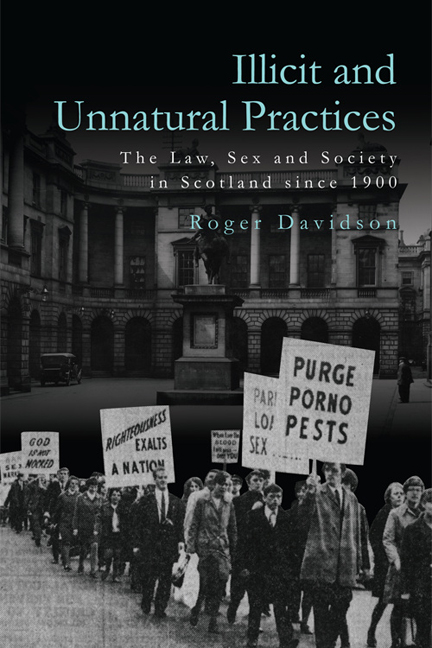Book contents
- Frontmatter
- Contents
- List of Figures and Tables
- Acknowledgements
- List of Abbreviations
- 1 Introduction
- 2 ‘Venereal Trouble’: The Case of ‘Professor’ Abraham Eastburn
- 3 ‘This Pernicious Delusion’: Law, Medicine and Child Sexual Abuse
- 4 ‘Unnatural Carnal Connection’: Bestiality and the Law in Early Twentieth-century Scotland
- 5 ‘There’s the Man who Shifts the Babies’: Abortion in the Scottish High Court, 1900−30
- 6 ‘An Open and Notorious House of Lewdness’: Dora Noyce and the Danube Street Brothel
- 7 Cure or Confinement? Law, Medicine and the Treatment of Homosexual Offenders in Scotland, 1950−80
- 8 ‘Liable or Likely to Deprave and Corrupt the Morals of the Lieges’: Sex Shops and Moral Panic in Late Twentiethcentury Scotland
- 9 ‘Culpable and Reckless Conduct’: Criminalising the Transmission of HIV in Scotland, 1983−2014
- 10 Conclusion
- Sources and Select Bibliography
- Index
4 - ‘Unnatural Carnal Connection’: Bestiality and the Law in Early Twentieth-century Scotland
Published online by Cambridge University Press: 23 April 2021
- Frontmatter
- Contents
- List of Figures and Tables
- Acknowledgements
- List of Abbreviations
- 1 Introduction
- 2 ‘Venereal Trouble’: The Case of ‘Professor’ Abraham Eastburn
- 3 ‘This Pernicious Delusion’: Law, Medicine and Child Sexual Abuse
- 4 ‘Unnatural Carnal Connection’: Bestiality and the Law in Early Twentieth-century Scotland
- 5 ‘There’s the Man who Shifts the Babies’: Abortion in the Scottish High Court, 1900−30
- 6 ‘An Open and Notorious House of Lewdness’: Dora Noyce and the Danube Street Brothel
- 7 Cure or Confinement? Law, Medicine and the Treatment of Homosexual Offenders in Scotland, 1950−80
- 8 ‘Liable or Likely to Deprave and Corrupt the Morals of the Lieges’: Sex Shops and Moral Panic in Late Twentiethcentury Scotland
- 9 ‘Culpable and Reckless Conduct’: Criminalising the Transmission of HIV in Scotland, 1983−2014
- 10 Conclusion
- Sources and Select Bibliography
- Index
Summary
INTRODUCTION
On several occasions in November 1914, Alexander Ashwood, a carting contractor with premises in Park Street, Motherwell, discovered that the padlock on his stable door had been forced and that a barrel had been placed behind the mare that was housed there. He reported these incidents to the police but, before they could investigate, he witnessed Owen Gunnery, an unmarried labourer who lodged in an adjoining house, standing at the rear of the mare ‘with his trousers unbuttoned and his member inserted into the mare's parts’. According to Ashwood, the mare's tail was up and she was discharging as if she was being served. A struggle ensued and Gunnery escaped but, when he was later apprehended at his lodgings, the police noticed discharge on his trousers and shirt.
Meanwhile, the police had collected forensic evidence from the scene of the crime including a sample of the hairs and discharge from the mare's hindquarters as well as precise measurements of the height of the barrel and the animal's private parts. The evidence was duly examined by Dr Joseph Hume Patterson, Bacteriologist for the County of Lanark, along with the clothes worn by the accused. On Gunnery's shirt Patterson found coarse hairs that matched those of the mare, fragments of hay and particles of ‘foreign faeces’. He also found matching hairs on Gunnery's trousers and drawers along with ‘recent seminal fluid’ although he could not detect any spermatozoa from specimens taken from the mare. Despite having admitted to the police that he had had ‘connection’ with the mare on three separate occasions, blaming his behaviour on drink, Gunnery initially pleaded not guilty at Hamilton Sheriff Court to a charge of bestiality. However, when the case was remitted to the High Court in Glasgow in February 1915, he changed his plea to guilty and was sentenced to six months imprisonment.
Some fifteen years later, on 3 February 1929, two police constables on patrol in New Cumnock, Ayrshire, entered the steading of Broadfoot Farm and noticed the reflection of a flickering light on the skylight window of the byre.
- Type
- Chapter
- Information
- Illicit and Unnatural PracticesThe Law, Sex and Society in Scotland since 1900, pp. 51 - 73Publisher: Edinburgh University PressPrint publication year: 2018



